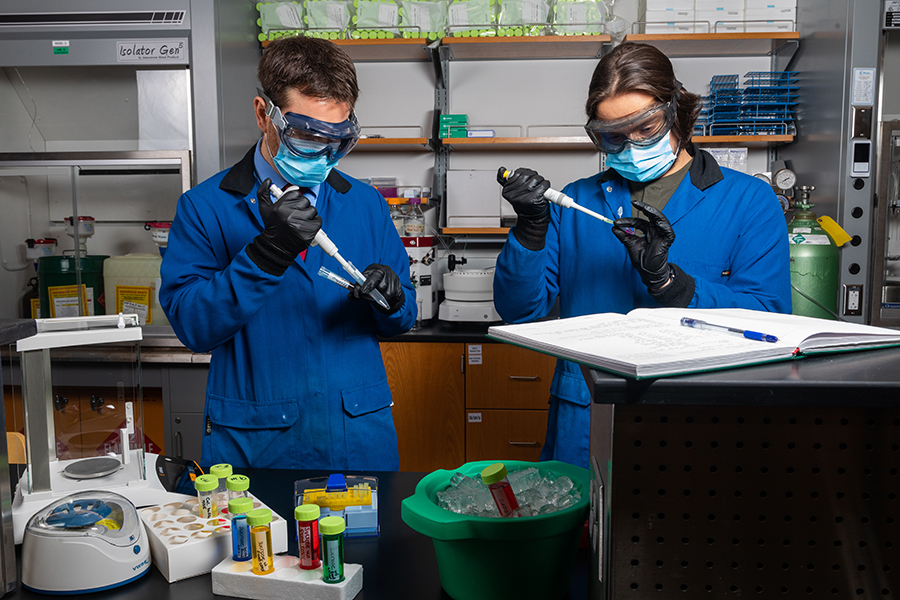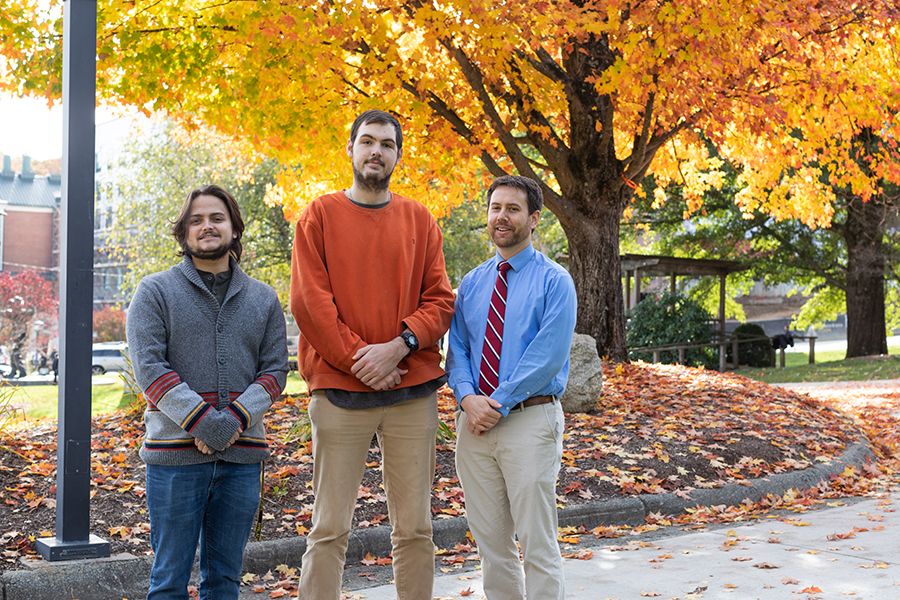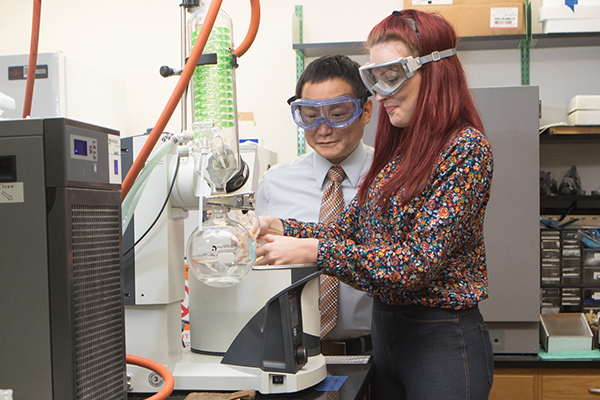
Assistant professor Dr. Michael Reddish, left, and Ethan Harris test samples in the lab in Appalachian State University’s A.R. Smith Department of Chemistry and Fermentation Sciences, where they investigate treatments for triple-negative breast cancer — work funded by a grant from the North Carolina Biotechnology Center. Harris is a senior from Clemmons who is double majoring in chemistry-biochemistry and biology-cellular/molecular biology. Photo by Chase Reynolds
BOONE, N.C. — A research team at Appalachian State University is investigating effective treatments for one of the most aggressive types of breast cancer — with the goal of reducing adverse side effects.
Dr. Michael Reddish, assistant professor in App State’s A.R. Smith Department of Chemistry and Fermentation Sciences, has been awarded a grant from the North Carolina Biotechnology Center (NCBC) to study medications proposed to treat triple-negative breast cancers, which he said have “the least number of and least effective treatment options available.”
According to the National Breast Cancer Foundation Inc., a diagnosis of triple-negative breast cancer means the three receptors that fuel most breast cancer growth — estrogen, progesterone and the HER-2 gene — are not present in the tumor, and common treatments like hormone therapy are ineffective. Approximately 10% to 20% of breast cancers are triple negative.
Research from other groups has shown high concentrations of a particular sterol — 27-hydroxycholesterol (27HC) — are associated with triple-negative breast cancer and cancer metastasis, which is the development of malignant growth elsewhere in the body, Reddish said.
Medications can inhibit production of the sterol 27HC, but this presents a problem: “The inhibitors will also likely alter metabolism of vitamin D, which could lead to increased cases of osteoporosis in patients,” Reddish explained.

Dr. Michael Reddish, assistant professor in Appalachian State University’s A.R. Smith Department of Chemistry and Fermentation Sciences, far right, leads a team of App State student researchers who are testing medications for triple-negative breast cancer, in hopes of finding one that minimalizes adverse side effects. Pictured with Reddish are Ethan Harris, a senior from Clemmons who is double majoring in chemistry-biochemistry and biology-cellular/molecular biology, far left, and Noah Arnold, a senior chemistry-biochemistry and biology-cellular/molecular biology double major from Mount Pleasant. Photo by Chase Reynolds
In his lab at App State, Reddish and his team are testing medications in hopes of finding one that inhibits the sterol production while minimizing the vitamin D reaction.
“If we can make such a finding, this would elevate that drug as a good treatment option, or other chemists could use that drug to optimize and make an even better drug,” Reddish said.
Several App State students are assisting Reddish in his work, including Ethan Harris, a senior double majoring in chemistry-biochemistry and biology-cellular/molecular biology.
“I have a passion for this kind of work because I want to help people,” Harris said. “Cancer has affected several members of my family, so I feel a connection.”
Harris, who is from Clemmons, said working in the lab has helped him realize he would like to pursue a career in research. He plans to pursue a Ph.D. in biochemistry.
What do you think?
Share your feedback on this story.
About the A.R. Smith Department of Chemistry and Fermentation Sciences
The A.R. Smith Department of Chemistry and Fermentation Sciences offers a Bachelor of Arts in chemistry, a Bachelor of Science in chemistry with eight different concentrations and an interdisciplinary Bachelor of Science degree in fermentation sciences. The department’s programs prepare students to attend graduate and professional schools, as well as for employment in the pharmaceutical and fermentation industries and other business sectors. Learn more at https://dcfs.appstate.edu.
About the Department of Biology
The Department of Biology is a community of teacher-scholars, with faculty representing the full breadth of biological specializations — from molecular genetics to landscape/ecosystem ecology. The department seeks to produce graduates with sound scientific knowledge, the skills to create new knowledge, and the excitement and appreciation of scientific discovery. Learn more at https://biology.appstate.edu.
About the College of Arts and Sciences
The College of Arts and Sciences (CAS) at Appalachian State University is home to 17 academic departments, two centers and one residential college. These units span the humanities and the social, mathematical and natural sciences. CAS aims to develop a distinctive identity built upon our university's strengths, traditions and locations. The college’s values lie not only in service to the university and local community, but through inspiring, training, educating and sustaining the development of its students as global citizens. More than 6,800 student majors are enrolled in the college. As the college is also largely responsible for implementing App State’s general education curriculum, it is heavily involved in the education of all students at the university, including those pursuing majors in other colleges. Learn more at https://cas.appstate.edu.
About Appalachian State University
As a premier public institution, Appalachian State University prepares students to lead purposeful lives. App State is one of 17 campuses in the University of North Carolina System, with a national reputation for innovative teaching and opening access to a high-quality, cost-effective education. The university enrolls more than 21,000 students, has a low student-to-faculty ratio and offers more than 150 undergraduate and 80 graduate majors at its Boone and Hickory campuses and through App State Online. Learn more at https://www.appstate.edu.



![How NCInnovation Is Rethinking Economic Development in North Carolina [faculty featured]](/_images/_posts/2026/02/rethinking-economic-development-600x400.jpg)








